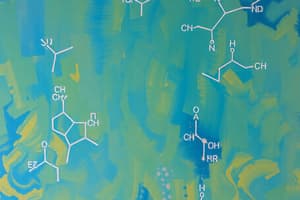Podcast
Questions and Answers
Which reaction process would convert propanone to propene?
Which reaction process would convert propanone to propene?
- Rearrangement followed by polymerization
- Reduction followed by dehydration (correct)
- Oxidation followed by condensation
- Hydrogenation followed by hydrolysis
What is a suitable method to convert benzoic acid to benzaldehyde?
What is a suitable method to convert benzoic acid to benzaldehyde?
- Decarboxylation (correct)
- Reduction with lithium aluminum hydride
- Nitration followed by hydrolysis
- Oxidation with chromic acid
Which pair of reactions is appropriate for converting ethanol to 3-hydroxybutanal?
Which pair of reactions is appropriate for converting ethanol to 3-hydroxybutanal?
- Oxidation followed by Grignard reaction
- Oxidation followed by a nucleophilic addition (correct)
- Dehydration followed by reduction
- Esterification followed by nucleophilic addition
To transform benzene into m-nitroacetophenone, which series of reactions should be employed?
To transform benzene into m-nitroacetophenone, which series of reactions should be employed?
Which reaction sequence leads to the conversion of benzaldehyde to benzophenone?
Which reaction sequence leads to the conversion of benzaldehyde to benzophenone?
Flashcards are hidden until you start studying
Study Notes
Conversions of Organic Compounds
-
Propanone to Propene
- Use a dehydration reaction with an acid catalyst to eliminate water from propanone, forming propene.
-
Benzoic acid to Benzaldehyde
- Convert benzoic acid to benzaldehyde via reduction using lithium aluminum hydride (LiAlH4) or another reducing agent.
-
Ethanol to 3-Hydroxybutanal
- Perform an aldol condensation by reacting ethanol with acrolein or propanal, followed by further reduction if necessary.
-
Benzene to m-Nitroacetophenone
- Nitration of benzene to form nitrobenzene, followed by Friedel-Crafts acylation with acetic anhydride or acetyl chloride.
-
Benzaldehyde to Benzophenone
- React benzaldehyde with phenyl magnesium bromide (Grignard reagent) to introduce a phenyl group, forming benzophenone after hydrolysis.
-
Bromobenzene to 1-Phenylethanol
- Use a Grignard reaction with ethylene oxide, allowing bromobenzene to react and yield 1-phenylethanol upon hydrolysis.
-
Benzaldehyde to 3-Phenylpropan-1-ol
- Conduct a reaction with appropriate Grignard reagent (like phenyl magnesium bromide) followed by acid-catalyzed hydrolysis.
-
Benzaldehyde to α-Hydroxyphenylacetic acid
- Convert benzaldehyde into α-hydroxy ketone through a reaction with hydrocyanic acid followed by acidic hydrolysis.
-
Benzoic acid to m-Nitrobenzyl alcohol
- Perform nitration to generate m-nitrobenzoic acid, then reduce the acid to m-nitrobenzyl alcohol with LiAlH4 or a similar reducing agent.
Studying That Suits You
Use AI to generate personalized quizzes and flashcards to suit your learning preferences.





